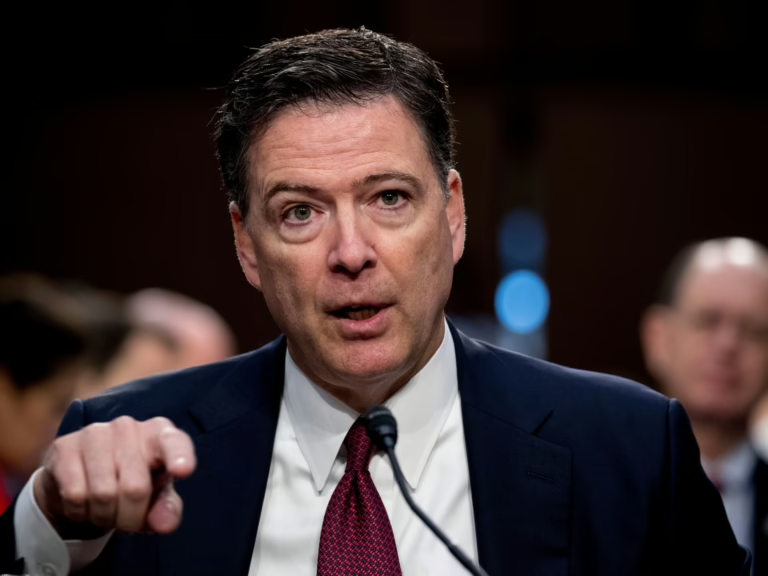James Comey, the former Director of the Federal Bureau of Investigation (FBI) in the United States, has been formally charged with providing false testimony to Congress.
This marks the first time a high-ranking former government official has faced legal action connected to one of President Donald Trump’s most persistent grievances: the probe into Russian meddling in the 2016 presidential election.
The Department of Justice has indicated that if convicted, Comey could be sentenced to up to five years behind bars.
Here is a detailed overview of the situation:
Background on James Comey
James Comey served as the FBI Director from 2013 until 2017, initially appointed during President Barack Obama’s administration.
In 2017, shortly after Donald Trump assumed the presidency, he dismissed Comey amid an ongoing inquiry into whether Trump or his campaign collaborated with Russia to influence the 2016 election, which Trump won against Democratic nominee Hillary Clinton.
Following Comey’s removal, Special Counsel Robert Mueller took charge of the investigation, which spanned nearly two years and uncovered significant Russian efforts to interfere in the election. Although the probe did not establish criminal conspiracy between Trump’s team and Russia, it cast a long shadow over Trump’s presidency, who repeatedly denounced it as a “witch hunt.”
Details of the Charges Against Comey
The allegations against Comey do not pertain to the substance of the Russia investigation itself but focus exclusively on whether he deliberately misled senators during his 2020 testimony before the Senate Judiciary Committee.
During a hearing on September 30, Republican Senator Ted Cruz questioned Comey about whether he had ever authorized FBI personnel to leak information to the media regarding investigations into Hillary Clinton’s emails or potential connections between the Trump campaign and Russia.
Comey denied ever permitting anyone within the FBI to serve as an anonymous source for news outlets. However, this contradicted statements from former FBI Deputy Director Andrew McCabe, who testified that Comey had indeed granted such permission.
- The first count in the indictment accuses Comey of knowingly making false statements under oath during the hearing.
- The second count charges him with obstructing a congressional proceeding by providing deceptive and misleading testimony.
The Trump administration has sought to portray the Russia investigation as a politically motivated effort by the Obama administration to exploit Moscow’s interference and delegitimize Trump’s electoral victory.
Context of Comey’s 2020 Testimony
The Senate Judiciary Committee, controlled by Republicans, was examining errors made by the FBI at the outset of the Russia probe.
During the session, senators questioned Comey about the FBI’s reliance on a dossier containing unverified allegations about Trump’s connections to Russia. This dossier, which has since been widely discredited, was instrumental in securing a warrant to surveil a former Trump campaign advisor.
Comey acknowledged that mistakes in the warrant application were significant but maintained that the investigation overall was “largely conducted appropriately.”
The inquiry into whether Comey authorized FBI officials to anonymously leak information to the press arose in this context.

Understanding an Indictment
In federal legal proceedings, an indictment is issued after a grand jury concludes there is sufficient evidence to charge someone with a crime.
The U.S. Department of Justice defines an indictment as a formal written accusation that notifies an individual they are suspected of criminal conduct and will face trial.
This document outlines the specific charges brought against the accused.
Role of a Grand Jury
A grand jury is a panel of citizens assembled by prosecutors to evaluate whether probable cause exists to initiate criminal charges.
It is important to note that grand juries do not determine guilt or innocence.
Next Steps Following an Indictment
Once a grand jury approves an indictment, the legal process advances. The defendant may be arrested or summoned to court.
The initial court appearance, known as an arraignment, involves formally reading the charges and entering a plea. Subsequent pretrial procedures include evidence exchange and filing motions. The case might be resolved through a plea bargain between the defense and prosecution.
If no agreement is reached, the matter proceeds to trial, where a jury evaluates the evidence and renders a verdict. Upon conviction, the judge imposes sentencing, which could involve imprisonment, fines, or probation.
Scheduled Date for Comey’s Arraignment
Comey’s arraignment is scheduled for October 9 at 10 a.m. local time (14:00 GMT) in Virginia.
Following the indictment, his lawyer, Patrick J. Fitzgerald, issued a statement asserting: “Jim Comey denies all charges in full. We anticipate proving his innocence in court.”
Donald Trump’s Response to the Indictment
Trump took to Truth Social to celebrate the indictment, declaring: “JUSTICE IN AMERICA! James Comey, one of the most corrupt individuals this country has ever seen, has been indicted.”
He added, “Today, a grand jury charged him with two felony counts for various illegal and unlawful actions.”
.@POTUS: “JUSTICE IN AMERICA!” pic.twitter.com/polaL0r6ky
– Rapid Response 47 (@RapidResponse47) September 25, 2025
Attorney General Pam Bondi emphasized that “no one is above the law,” framing the indictment as evidence of the Justice Department’s dedication to holding powerful figures accountable.
Comey’s Reaction to the Charges
Comey posted a video on Instagram stating: “My family and I have long understood the consequences of standing up to Donald Trump. Yet, we cannot imagine living any other way. We refuse to live in submission, and neither should you.”
He continued, “I have full faith in the federal judicial system and maintain my innocence. Let the trial proceed, and keep believing in justice.”
Opposition to Comey’s Indictment
The charges against Comey have sparked criticism that the Justice Department, under Bondi’s leadership, is being exploited by Trump to target his political adversaries.
Opponents argue that the White House’s involvement blurs the boundary between legal proceedings and political maneuvering.
Trump publicly pressured Bondi to pursue charges against Comey and expressed frustration over the lack of prosecutions from prior investigations. He also announced his intention to nominate Lindsey Halligan, a loyalist lacking federal prosecutorial experience, to lead the U.S. Attorney’s office in Virginia.
The Eastern District of Virginia, responsible for prosecuting the case, was already unsettled after its chief prosecutor resigned amid pressure to investigate another Trump opponent, New York Attorney General Letitia James. Halligan advanced the Comey case to a grand jury despite warnings from seasoned prosecutors.
“This kind of interference represents a dangerous misuse of authority,” stated Democratic Senator Mark Warner of Virginia.
“By removing an experienced, independent prosecutor and replacing them with a partisan loyalist, Trump is weakening one of the nation’s most critical U.S. Attorney’s offices and undermining the rule of law.”
Legal scholars caution that this development sets a troubling precedent.
“Trump has openly admitted to using presidential power to retaliate against political foes and personal enemies,” explained Sahar Aziz, Distinguished Professor of Law at Rutgers University.
“This is unprecedented because it weaponizes the criminal justice system against a former senior official,” she added.
“It also establishes a precedent that similar actions could be taken against Trump himself and his appointees, signaling a shift toward authoritarianism.”

















